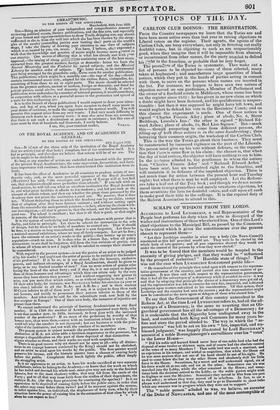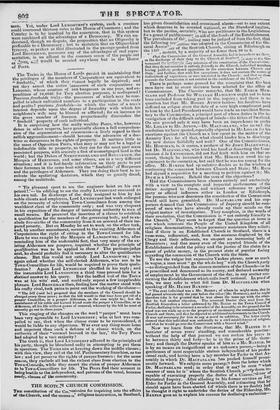SCRAPS OF WISDOM FROM THE LORDS.
ACCORDING to Lord LYNDHURST, a real Representative of the People best performs his duty when he acts in disregard of the wishes and instructions of those who elected him. One of this Lord's chief objections to the Municipal Bill, as passed by the Commons, is the control which it gives the constituencies over the persona chosen to represent them- " Let their Lordships consider in what way a body (the Town-Council) constituted as this bill provided would act. They were to be elected by the whole body of rate-payers; and all past experience showed they would act under the control of the persons by whom they were elected."
It was to be feared that the members would be tempted to the enormity of giving pledges, and that they would be " influenced by the prospect of reelection! " Horrible state of things! That was not the case when LYNDHURST first entered public life— He remembered the principle then acted upon with respect to the represen- tative government of the country, and carried also into minor matters of go. cerement. It was then said with respect to the representative government, that it had all the advantages of a democracy while it avoided its evils: it was said that by adopting that principle the abuses of a democracy were got rid of, and the representative was left to exercise his own fair, impartial, and uabiassed judgment upon matters submitted to his consideration. Of that system, their Lordships and the country had seen the reverse ; and the representative might now be considered as the mere agent or delegate of those who elected him."
To say that the Government of this country antecedent to the Reform Act, at the time Lord LYNDH URST refers to, bad all the ad- vantages of a Democracy, is the same as asserting that an Oli- garchical government has all the advantages of a Democracy ; for it is undeniable that the Oligarchy bore undisputed sway in the land, and controlled both King and Commons for many years be- fore and since the period alluded to. The way in which the " re- presentative" was left to act on his own " fair, impartial, and un- biassed judgment," was happily illustrated by Lord BROUGHAM'S account of a noble Boroughmonger's surveillance over his "votes" in the Lower House- " Did his noble and learned friend never hear of one noble lord who had the disposal of some twelve or thirteen seats, and of course had the absolute control of the votes of so many Members ? That noble lord was such a martinet, and so capricious in his temper, and withal so suspicious, that while the House sat he was most anxious that not one of his band should be out of his sight. He used to come below the bar in the other House and absolutely drill his little force in the House. Sometimes, by a secret and well understood signal, six of his force would sit at one side and six at the other. Sometimes one six was marched into the Lobby, while the other remained in the House ; and some- times both the divisions retired to the Lobby, as the noble patron might wish to frighten or coax the Minister. Sometimes they moved in files from one part to the other ; at others they were moved off in echellons. In fact, to use a phrase well understood in that day, they used to go to Dunstable to shoot larks while any measure was in progress which they were not to support." The " noble person" alluded to was, we believe, an ancestor of the Duke of NEWCASTLE, and one of the most contemptible of 'Dint Yet, under Lord LYNDHURST'S system, such a creature could Command thirteen votes in the House of Commons ; and the Cottn'try is to ho insulted by the assurance, that in this system Were combined all the advantages of a Democracy. We can un- derstand, though we dispute, the proposition that an Oligarchy is preferable to a Democracy ; but to maintain that an Oligarchical tyranny, so perfect as that illustrated in the passage quoted from Lord BROUGHAM, possesses any of the advantages of real repre- sentation, is an affront to the common sense of the people out
rs
40 COT o „ would be scouted anywhere but in the House of Peers.



























 Previous page
Previous page